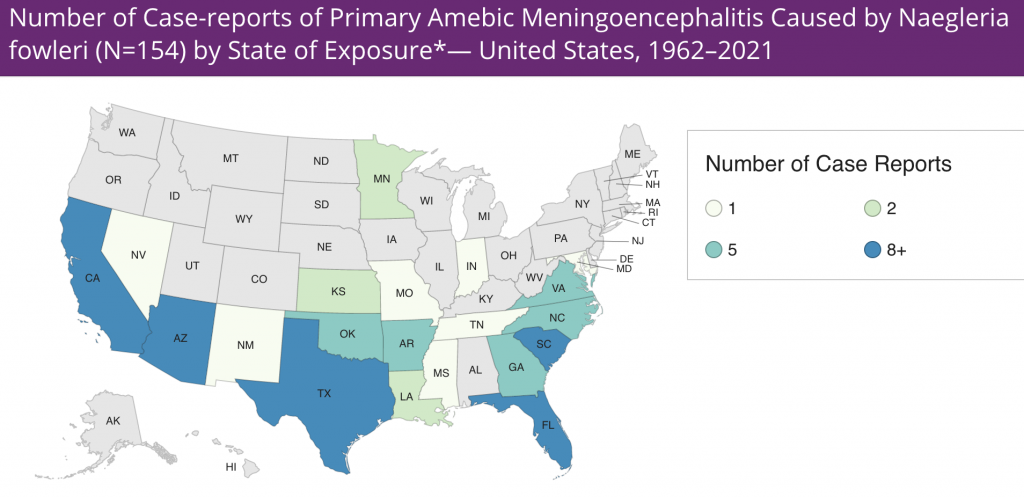- Every year, a few swimmers in the US are hospitalized after contracting brain-eating amoebas.
- Naegleria fowleri may cause a life-threatening brain infection if it enters through the nose.
- The amoeba lives in warm freshwater, mostly in the Southern states.
When a swimmer recently fell ill after visiting a lake in Iowa, health officials quickly shut down beaches in an abundance of caution.
The threat was not a shark or riptide, but a microscopic amoeba that entered through the swimmer's nose and starting eating away at their brain.
The individual, a Missouri resident, was in intensive care when health officials announced the case on July 7. According to the state health department, the case was only the second instance of Naegleria fowleri infection in a Missouri resident, and the first in 35 years.
The Centers for Disease Control and Prevention have been tracking infections associated with the amoeba and states where people have been exposed since 1962. While infections with Naegleria fowleri are rare, warming waters may expand the area where the amoeba can survive.
Why are brain-eating amoebas so lethal?
Naegleria fowleri is known as the brain-eating amoeba because it destroys healthy brain tissue. People can become infected if the amoeba enters through the nose while they are swimming or diving, not through any other form of exposure to contaminated water.
The amoeba causes a life-threatening infection called primary amebic meningoencephalitis (PAM). The infection is extremely rare, with 154 cases recorded in nearly 60 years of disease surveillance, but nearly everyone who has contracted it has died.
After initial symptoms like headache, fever, nausea, and vomiting, PAM is known to progress rapidly. Later symptoms may include stiff neck, confusion, loss of balance, seizures, and hallucinations. According to CDC data, the infection usually kills within an average of five days after the first symptoms.
The infection is notoriously difficult to treat and test for, as laboratory tests for PAM are only available at a few locations in the US. Because the disease is so rare and hard to detect, about 75% of diagnoses are made after the patient has died, according to the CDC.
They thrive in warm freshwater
The Centers for Disease Control and Prevention have been tracking reports of PAM since 1962. A map of case reports through 2021 shows exposures in 20 states, with most reports coming from the South.
The amoeba thrives in warm freshwater, including lakes, rivers, and occasionally contaminated tap water or swimming pools. In 2020, a 6-year-old boy died in Texas after playing at a local splash pad that was not properly chlorinated.
Texas has reported the most cases of Naegleria fowleri infection, with 40 known infections since the CDC began collecting data. Florida has reported 36 infections.
Other states with eight or more infections — the highest range noted on the CDC map — include California, Arizona, and South Carolina.
Brain-eating amoebas may be moving north as waters warm
Recent data have not shown an increase in case reports over the past few years. In 2019, 2020, and 2021, three cases were reported to the CDC per year. However, the geographic footprint of Naegleria fowleri may be expanding, one expert told NBC News.
Julia Haston, a medical epidemiologist with the CDC, told NBC that one of the PAM cases reported in 2021 came from Northern California. The exposure occurred at a similar latitude to the case that's under investigation in Iowa, suggesting that warming temperatures have made it possible for the amoeba to spread northwards.
For now, the CDC says people swimming in warm freshwater — especially in Southern states — should assume they have a low level of risk of contracting the amoeba.

